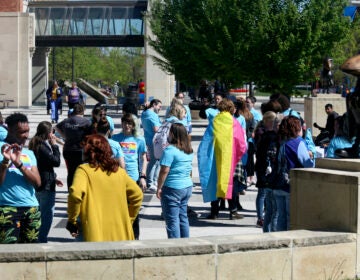Council eyes expansion of prevailing wage law for building service employees

Philadelphia is one of only a handful of municipalities in the country with a prevailing wage law for building services workers, which requires that janitors and security guards employed in large projects benefiting from city funding or tax breaks be paid a citywide standard.
This week a bill that would greatly expand the categories of projects covered by the law is racing towards passage. Introduced by Councilwoman Helen Gym, and championed by labor groups including Service Employees International Union (SEIU) 32BJ, the expanded prevailing wage bill would also cover hospitals, universities, stadiums, convention centers, airports or ports. Major anchor institutions like Temple, Thomas Jefferson, and the University of Pennsylvania will be affected by the legislation, although it is unclear to what extent.
In addition to adding new covered categories, the legislation would still cover the large office and apartment buildings to which the 2007 building services prevailing wage laws applies. But it would change the size of the buildings covered from at least 25,000 square feet or 25 units to those of at least 50,000 square feet or at least 50 units. This building-related change was included so that smaller non-profits and community groups wouldn’t be affected by a more expansive law. Those backing the bill don’t believe that any workers currently covered will lose the benefit of the prevailing wage because of this proposed tweak.
The Labor and Civil Service Committee held a hearing on the bill last Wednesday, where it encountered no opposition. The bill then received its first reading before the full City Council the following day, where it sailed through as well. Final passage will likely be secured at Thursday’s council session.
Prevailing wage laws set common payment standards based on the amount earned by a majority of workers in a particular locality, making it impossible for companies that receive public assistance to pay less than the average rate for particular jobs. Prevailing wage laws are common in the construction sector across the country. In Philadelphia prevailing construction wage rates for publicly-assisted projects are usually over $30 per hour (depending on the class of labor it can be above $70) not including fringe benefits.
The prevailing wage rates for service sector employees is much lower. For unarmed security guards the prevailing wage is $13.28 plus $4.27 for benefits. That’s still higher than most unarmed security guards make now whether they are union or not, and higher than what nonunion janitors make as well. (Security officers at Temple and Penn make as low as $10.25 an hour with a union, although Drexel’s base pay is a little more),
In many cities where union density in the building services sector is low-to-nonexistent, prevailing wage laws would make little sense because everyone is being paid closer to minimum wage. In Philadelphia janitors in the long unionized Center City office market have been making over $15 for years plus pension and free health care. Indeed, the prevailing wage for janitors is based on the current contract rate of $16.89 plus benefits). In this city, a prevailing wage in the building services sector makes a big difference, especially for non-union workers.
Many of the building services workers at Temple, Drexel, and the University of Pennsylvania are already organized, and some will be getting a pay bump from the legislation.
In cases where the building services workforce isn’t unionized, such as the Philadelphia International Airport, the effect is not entirely clear. At least in most of the universities and hospitals SEIU and other unions have some foothold and a knowledge of who gets paid what. But at the airport, where SEIU and other unions have been trying to organize for years, they are unsure which workers there will be included in the expanded prevailing wage law. But once they figure that out, the new legislation could, in theory, aid in their long term campaign there.
“Possibly it will be easier to unionize them if they already have to pay a service contractor the prevailing wage,” says Stephen Herzenberg, the executive director of the Keystone Research Center. “That’s one way you make employers indifferent to unionization, if they know other people will have to pay the same or almost the same so it won’t put them at a disadvantage.”
WHYY is your source for fact-based, in-depth journalism and information. As a nonprofit organization, we rely on financial support from readers like you. Please give today.







